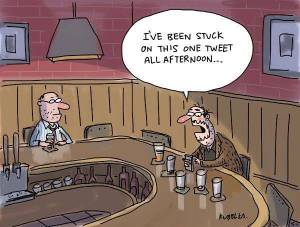 We all do it. We are working on a story…tolling along…when we suddenly realize that we are thinking about our story 24 hours a day. While taking a shower, while driving, while in conversations with other people…hell you are even lying in bed, wide wake running through character traits. How do you know when it is all too much?
We all do it. We are working on a story…tolling along…when we suddenly realize that we are thinking about our story 24 hours a day. While taking a shower, while driving, while in conversations with other people…hell you are even lying in bed, wide wake running through character traits. How do you know when it is all too much?
The answer is, when all you can think about is your story or if your child is on fire after trying to make bacon and you find yourself trying to figure out just the right description for what the fire looks like as it fries him/her…you are way too obsessed with your manuscript. Writing is supposed to be fun and if you are obsessed the writing is no longer fun…it’s work and work sucks.
I do a number of things when I realize that I am obsessing about a story. I can usually tell when I am over thinking it all when I begin to go over and over the same line or scene rewriting it 50 or more times because it just-doesn’t-sound-right. I know that you all just want to finish the damn book but I have heard stories of writers who over think too much and end up not publishing a thing. At some point you have to more on and stop trying to polish a hole in the page.
So how do you stop over thinking? Here are some ideas…feel free to add more in the comments section.
- Put down the pen mam’ and step away from the desk – Breaks are essential to any good writing. While it feels like we could just sit and do it forever, we really shouldn’t. Take a break.
- Put it away for a while – Put that manuscript on a time out. Stick it in a drawer for a predetermined amount of time and then come back to it. Sometimes, like good wine – it just needs to breathe.
- Read to a friend – This often works for me. I grab the part I am stuck on and run to my favorite reader and biggest fan…my spouse. Trust me, if it sounds like bird poop, they will tell me.
- Retype the previous 4 pages – I have tried this and if actually worked. Sometimes as writers we simply loose our rhythm. Rewriting will run us right up to where we are stuck and hopefully over the hump.
- Put a bullet in it – I know that this is extreme but I have been working on manuscripts that just were never going to get finished because I have either lost my passion for the story or it just wasn’t meant to be. It’s okay once in a while to just file a manuscript in the round file marked crap-I-shouldn’t-have-started-in-the-first-place.
These are just a few suggestions; I know that other writers also have ideas. The thing to remember is that every writer has this problem. The thing to figure out is are you going to let it stop you all together or can you simply move on?
© The Writer’s Advice, 2013. Unauthorized use and/or duplication of this material without express and written permission from this blog’s author and/or owner is strictly prohibited.
Like this:
Like Loading...
Tags: advice, author, book, Character, creation of character, healthy, inspiration, Inspire, Jai Colvin, Jai Farris, learning, novel, novelist, story, structure, time management, writer, writers, writing, writing process, Writing tools
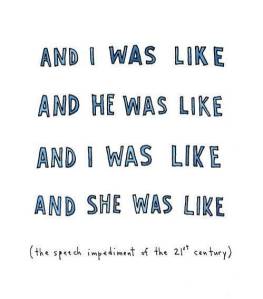
I have been writing for over 30 years. I love it. It is the only thing I have ever felt comfortable doing. But I was honest, and I mean really honest, I would admit that, at times, I get lazy with my writing. I get lazy because writing, just like everything else one can do in life, can get tedious.
What does “lazy” look like in the writer’s world? Well it’s not editing correctly, (using your and you’re interchangeably) it’s using dialog that sounds like the 12 year old girl next door, (like, you know…) it’s telling your story with no regard to tense…it’s a lot of things that will bore your reader into trying to slit his/her own wrists with a Lego before vowing to never again read anything with your name on it.
Here’s a little secret that I have discovered over the years in terms of lazy writers though…lazy is as lazy does. My getting lazy actually has less to do with my actual writing and more to do with how I am living my life. I am at my laziest when I stop showering every morning, when I have a nice sloppy pile of coffee cups on the corner of my desk because I am too lazy to move them, when I find myself typing in my boxers because, well, I simply couldn’t find any clean sweats because I have not done laundry. Laziness for the writer is like an illness that starts with the person and then bleeds through to the writing.
I admitted all that to say this…it is really important that you make your life as a writer just as important as if you were the CEO at Best Buy. You have to “arrive” at your desk after taking a shower and getting dressed, cup of coffee in hand like it is a real job. If you don’t treat your writing like a real job both you and your writing will suffer laziness. It’s easy to let it all fall by the wayside when you work from home…its home after all…whose gonna know? Well, you are gonna know, and then your writing suffers and your readers will know by the laziness in your work.
Get up every morning with purpose and hit that keyboard with the intention of doing it right. Don’t be lazy about your life or your writing because if you do the end result will be the same…more laziness.
© The Writer’s Advice, 2013. Unauthorized use and/or duplication of this material without express and written permission from this blog’s author and/or owner is strictly prohibited.
Like this:
Like Loading...
Tags: book, inspiration, Inspire, Jai Colvin, Jai Farris, lazy writer, learning, novel, novelist, organization, organize, story, time management, writer, writers, writing, writing process, Writing tools

I hate to be interrupted when I am killing folks. Nothing is more annoying than when, in the middle of offing someone, the kids come in and bug me. Seriously…don’t they realize how hard it is to kill a person?
On the one hand, I hope my kids never learn how hard it is to kill someone unless that is; they are a writer like me. One the other hand, I do wish that those around me would realize that when I am in the mode or the moment, I really need to be left alone. I live in a household with kids who have been raised to talk all the time. I was a newspaper reporter for a long time and needless to say they get their excessive need to vocalize constantly from me and, trust me, I am paying for it now.
It is really important to set boundaries when you are a writer. First, you work from home so to most folks in the family that mean easy access. Second, you are “just typing” after all, so the concept of interrupting is not as foreign as say if you were a bomb maker. (No one wants to bug that guy for some reason) And finally, because there is no way for a person who does not write to truly understand the process, well, folks just kind of sluff it off. “You aren’t really doing anything important…”
So how does a writer set these very important boundaries? Truth be told it depends on the age of your kids. If you have toddlers you can’t very well slam the door in their faces so with them set a time to write during nap time or after they go to bed at night. With teens, they get it so just simply make the rules known and then enforce them. Set your writing time and then declare it off limits. As for your spouse, they married you so they knew what they were getting into, just talk to them, they will understand. And if that doesn’t work, the next time they are taking a nice relaxing bath, go into the bathroom and go potty….this will reinforce the need for privacy, trust me.
As a writer you have to have time to write uninterrupted. Most of us either work from home or we are fitting our writing in during the time we are off the “real” job…this demands some periods of writing that can be done so that the stream of your scenes and story flow uninterrupted. So don’t be shy, demand that folks adhere to your boundaries and if they don’t there is always that bathroom thing which just may work on the teenaged kids too.
© The Writer’s Advice, 2013. Unauthorized use and/or duplication of this material without express and written permission from this blog’s author and/or owner is strictly prohibited.
Like this:
Like Loading...
Tags: advice, author, book, boundaries, Character, creation of character, family, inspiration, Inspire, Jai Farris, kids, killing, learning, novel, novelist, pen, Point of View, story, teenagers, telling story, writer, writers, writing, writing process, Writing tools

I have had many, many discussions (ahem, arguments) over the years about tone. When I was younger my best friend used to say that I spoke in a certain “tone” when I was irritated and I would argue that I didn’t have a “tone”. For me a “tone” was a nasty inflection in one’s voice, as in my mom saying, “don’t take that tone with me” but now I know better. Now I know that a “tone” is so much more.
As a writer you have to actively set the tone for any story, short or otherwise. The reader needs a sense of what the mood of your story is. Setting the tone might be the way a character communicates or how a character sees the world around them. Sure it still describes how one might speak to another but when it comes to writing “tone” is part of the skeleton of your story.
How effective can tone be? Case in point….text messages. I often get responses from my better half telling me that they can tell how I feel about something by my “tone” in my text. A text…. At first I thought this was ridiculous. How could someone tell by a text message what my “tone” is? But the more I paid attention to how I was feeling when sending certain text messages I realized that they were right…I did have a tone.
A lot of readers will tell you that they didn’t like this book or that but can’t tell you why…my guess is the tone. If you need proof of tone in your own writing, slap it into a text reader and listen. Most text readers are fairly monotone but if you really listen, you will hear the tone still coming through. I started doing this recently and it helps. (It also helps to show you where certain scenes aren’t working)
So while you are laying the groundwork for your next story, don’t forget the tone. It may been silly to worry about it but in the end you will see that setting the right tone just might be half the battle.
© The Writer’s Advice, 2013. Unauthorized use and/or duplication of this material without express and written permission from this blog’s author and/or owner is strictly prohibited.
Like this:
Like Loading...
Tags: advice, author, book, Character, inspiration, Inspire, Jai Farris, learning, novel, novelist, organize, setting the tone, story, structure, telling story, tone, writer, writers, writing, writing process, Writing tools
 A lot of you have been asking me lately how I feel about the editing process. I would like to say that editing is a pure joy, a semblance of bliss within the writing process…but I’d be lying.
A lot of you have been asking me lately how I feel about the editing process. I would like to say that editing is a pure joy, a semblance of bliss within the writing process…but I’d be lying.
For most writers the editing process sucks. Let’s face it, it’s not really writing…it’s editing. To some degree editing is counterintuitive for writers. (look Ma I used a big word…) We write, we aren’t geared towards editing. Editing is the slaughterhouse of manuscripts. It’s where you shoot a bolt gun into your masterpiece and then tear it down in steak-like portions. (Suddenly I am no longer hungry) BUT, editing can’t be ignored. Like the brother-in-law who calls himself a preacher after getting ordained online…you have no choice but to put up with it, no matter how ridiculous it feels.
I know that most of you have heard the advice, put your manuscript down for a bit before editing, edit it backwards, let someone else edit… And all of that might be great advice but here’s the rub…you wrote it. No matter who you are editing your work is a painful process so for that reason it is doubly important that you come up with an editing process that works for you.
Some writers hear of a process and can adopt it just fine but in my opinion I think it is easier to find your own groove and then stick with it. I edit after the story is complete. I read it through on my own and then I have a text reader read it to me in a sexy British accent. (The software program I use does that, its kinda cool) I admittedly cut the fluff but I also add to more than not during the editing process. What helps me most? Not thinking of it as “editing” but instead I am “refining” my work. You know, bringing out the coolness.
Let’s face it, if you write you have to edit; there is no way around it. In the end the editing process IS a part of the writing process - sort of like having to dry the dishes after washing them….it just has to be done or mom (or your potential publisher) will ground you. So find an editing process that works for you and run with it. I don’t care if you have to edit while hanging upside down eating spaghetti through a straw…as long as you have a process.
© The Writer’s Advice, 2013. Unauthorized use and/or duplication of this material without express and written permission from this blog’s author and/or owner is strictly prohibited.
Like this:
Like Loading...
Tags: author, book, editing, editor, inspiration, Inspire, Jai Farris, learning, novel, novelist, story, structure, writer, writers, writing, writing process, Writing tools
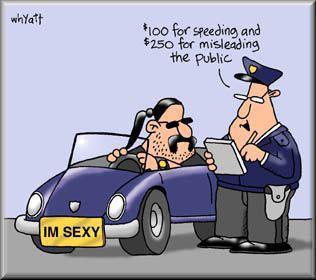 Every story has good and evil in some form. It doesn’t matter what your story is actually about there is a yin and yang to it…there has to be or it isn’t a story. Even when my 12 year old daughter comes home with a story about something that happened at school there is a good guy (Candice was just sitting there not bothering anyone) and a bad guy (and Tom came along and kicked her for no reason), it is one of the universal laws of humans.
Every story has good and evil in some form. It doesn’t matter what your story is actually about there is a yin and yang to it…there has to be or it isn’t a story. Even when my 12 year old daughter comes home with a story about something that happened at school there is a good guy (Candice was just sitting there not bothering anyone) and a bad guy (and Tom came along and kicked her for no reason), it is one of the universal laws of humans.
Now I know that you all enjoy creating the bad guys because, well, let’s face it, that’s fun. But what about the good guys? Surely it is impossible to screw up creating a good guy because he/she’s so good right? Wrong. The good is the thing that can actually make your good guy bad…confused? Let me explain…
If your characters are to be believable and if your readers are to connect with them they have to have flaws, especially the good guys. A good character can be too good to be true and when that happens the reader has nothing to relate to because, let’s face it; we are all flawed no matter what our intentions are. Case in point; if your good character saves a grandmother from a burning building, sets her down on the sidewalk and runs back into get her cat, saving it too and then provides the grandmother with a new place to live, a new car and set of steak knives…wow…great character, but who does that? Now if your good character saves a grandmother from a burning building, drops her on the front lawn, runs back in to save that cat but trips on the front foyer rug, falls on top of the cat that was trying to run out of the burning house and kills it and then buys the grandmother a coffee out of guilt for killing fluffy…well that is a tad more believable. Your good guy’s heart was in the right place but he/she is human right? Crap happens; it is what keeps us all humble.
Now I am not saying that your “good guys/gals” all have to do utterly stupid crap but they do need to have flaws to be believable. Make them good but maybe they over eat or tend to be late all the time. Maybe they always forget to tie their shoes and often trip into little old ladies or perhaps they are just notoriously bad tippers…whatever the flaw, it makes them human thus allowing your readers to relate.
So while writing those “good guys” stop for a minute and ask yourself…what makes this character human and then give him/her something that does. Trust me, your readers will better relate and your story will have that authentic ring that every writer wants.
© The Writer’s Advice, 2012. Unauthorized use and/or duplication of this material without express and written permission from this blog’s author and/or owner is strictly prohibited.
Like this:
Like Loading...
Tags: advice, author, book, Character, creation of character, inspiration, Inspire, Jai Farris, learning, novel, novelist, story, structure, writer, writers, writing, writing process, Writing tools
 Yesterday we talked about sending a book project on its way to the real world…today let’s talk about what to do when a book just isn’t holding up its end of the bargain anymore. Today, we are talking about letting go.
Yesterday we talked about sending a book project on its way to the real world…today let’s talk about what to do when a book just isn’t holding up its end of the bargain anymore. Today, we are talking about letting go.
I can’t explain how much I loved my very first book. When I finished that little gem, I was like a proud papa holding his first born boy. After all creating a book is akin to being pregnant or at least dealing with a pregnant wife. There are all those sleepless nights, all the complaining about how crappy you feel, all that staying in because no one wants to go out of the house looking haggard. There’s all that late night snacking, packing on the pounds….yep, being pregnant is just like writing a book. And just like giving birth to a human child, giving birth to a book makes you proud and scared all at the same time.
And just like when that baby grows up and moves on, so does your book, but there is one huge difference….your child goes on living and you go on supporting them no matter what…but that book…well…it has a shelf life of sorts. There comes a time, even when it has gone on to grow up and be published, when you have to let it go.
My first book was published in 1983. That’s over 30 years ago. (Yep feeling pretty old right now) And although you can still find it in some bookstores and on Amazon, let’s face facts, it’s been 30 years. So at what point to we, as writers, let go of a book that has been long ago published? When do we stop pounding the walk to sell it or brag about it to our friends and family? The answer is…never but now. Let me explain…
Although I don’t advocate letting a book go, ever…I also don’t want to give you the impression that you should still be putting a lot of energy into marketing that 30 year old book. To be honest, by now, in 30 years, you should have produced many other projects that get to stand at the head of the line in terms of marketing and promotion. If you haven’t, you may want to take another look at that postal worker job. (no, wait, not the post office, they are dying too, how about Burger King…don’t like horsemeat? Ok, how about opening that thrift store?) Whatever you decide you should not be still actively promoting that older book because if you do you are taking time away from the stuff from today’s work and that isn’t a good thing.
If your earlier works are good, they will continue to live and breathe in the hands of readers. At 30 years old, they no longer should need your help; they should stand on their own. (much like your kids) So let that first work be out there and go ahead and continue to create, adding more of your works to the fray. You don’t have to kill it, that first book, but you do have to allow it to move on thus allowing room on your marketing ticket for new projects. You have to take it off your list of priorities and be satisfied that it is out there in the world still showing its best face for you. I know, I know, you are a writer and letting go is like shooting one of your kids…so don’t shoot it, just let it be…Your time is better spent on the top of your works list, not the bottom.
© The Writer’s Advice, 2012. Unauthorized use and/or duplication of this material without express and written permission from this blog’s author and/or owner is strictly prohibited.
Like this:
Like Loading...
Tags: advice, author, book, inspiration, Inspire, Jai Farris, learning, novel, novelist, publishing, story, time management, writer, writers, writing, writing process, Writing tools
 Writer’s Note: Tuesdays Column.
Writer’s Note: Tuesdays Column.
Despite what the Rolling Stones would like us to believe…time is not on our side. As writers we are always under the gun with one deadline or another. As a newspaper reporter for many, many years I lived the bulk of my life with a deadline looming. I survived all those years of hurry up and get it done but it left some scars too.
These days I still tend to put deadlines on myself and this has translated into my novel work. I do think that setting goals is a good thing but I also think that setting deadlines as a novelist can be a very bad thing and here’s why…when you have a deadline you rush and rushing is not a good thing at all when it comes to writing a novel.
A novel has to be written as though life is passing through it. Life can’t be rushed. You, as the creator, have to take the time to live the moments that you convey within your story. You have to feel what your characters are feeling; you have to experience the emotion of the moments that you are stringing together, if you don’t, neither will your readers.
I would be willing to bet that you have personally read a novel or two where the writer rushed the story. You know the ones, you begin the book, the story is moving along at a decent pace and suddenly the writer kills everyone and the story is over. When you close the back cover of that book you feel cheated and you are left with questions that will never be answered like why did the main character Rick hate mashed potatoes? Everyone loves mashed potatoes right? What the heck?
Readers are not stupid and nor do they like to be rushed. They want to be romanced, drawn into the story and then taken on a ride…not an over the cliff-everybody dies ride and its over but a slow meandering through the story that not only shows them that the staff is headed over a cliff but also tells them why through the story. We need to be allowed to escape through books…that is, after all, the point.
So before you decide that you are going to write a novel in 30 days consider what that timeline is going to do to your story. Sure it’s fun every November to join in on the fun of NaNoWriMo, an annual novel writing project that brings together professional and amateur writers from all over the world, but is it worth it to do this to all your novels? I say no! Take your time, romance your reader and don’t rush a good thing…..
© The Writer’s Advice, 2012. Unauthorized use and/or duplication of this material without express and written permission from this blog’s author and/or owner is strictly prohibited.
Like this:
Like Loading...
Tags: book, characters, deadlines, Jai Farris, novel, story, The Writer's Advice, Time, writing
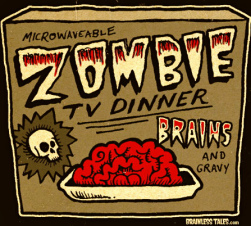 As a writer I have had a lot of people give me advice over the years. Some of them have even been other writers… You would be shocked at how much advice about writing I get from non-writers…(or maybe you wouldn’t) People have told me things like, have a backup plan in case the writing thing doesn’t work out. (I love how it’s a “writing thing” and not a job…I wouldn’t tell a cop to have a backup plan if that whole “cop thing” didn’t work out) I’ve also been told to make sure that I listen to every reader who has advice for me about a story…like I’d have time to write if I did. And I’ve been told to drop the writing hobby thing in general. Gotta love folks with good intentions and no brains…you know what I call that… a disappointing zombie smorgasbord…
As a writer I have had a lot of people give me advice over the years. Some of them have even been other writers… You would be shocked at how much advice about writing I get from non-writers…(or maybe you wouldn’t) People have told me things like, have a backup plan in case the writing thing doesn’t work out. (I love how it’s a “writing thing” and not a job…I wouldn’t tell a cop to have a backup plan if that whole “cop thing” didn’t work out) I’ve also been told to make sure that I listen to every reader who has advice for me about a story…like I’d have time to write if I did. And I’ve been told to drop the writing hobby thing in general. Gotta love folks with good intentions and no brains…you know what I call that… a disappointing zombie smorgasbord…
Despite the good intended people I have had some very good advice from writers I have crossed paths with along the way and some of it I have even used. (It is important to note here that just because someone gives you advice, it doesn’t mean you have to actually take it…just listen and use what you can.) Some of the best advice I have gotten has to do with the basics…those concepts that should be a given but we all somehow forget them in the grand scheme of things. So today I pass that advice on to you and even suggest that you consider printing them out and pinning them to your wall.
- Avoid passive voice
- Use active verbs
- Know your characters
- Make sure your story is worth telling
- Eliminate the words that aren’t needed – most adjectives and adverbs
These are the basics when writing a story and if you can always remember them they will save you time and grief down the line.
© The Writer’s Advice, 2012. Unauthorized use and/or duplication of this material without express and written permission from this blog’s author and/or owner is strictly prohibited.
Like this:
Like Loading...
Tags: advice, author, inspiration, Inspire, Jai Farris, learning, novel, novelist, story, structure, writer, writers, writing, writing advice, writing process, Writing tools, zombies
The following two items are among the best advice I have ever gotten. I am put them into graphics so that you can print them out and post them near your computer. I always take the best advice I have gotten from others over the years and posted it…it helps me remember that , (a) I am never alone and (b) that I should always learn…
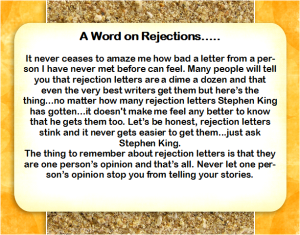
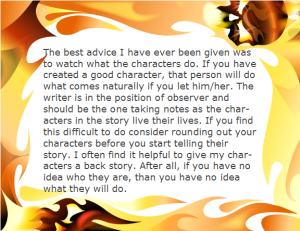
© The Writer’s Advice, 2012. Unauthorized use and/or duplication of this material without express and written permission from this blog’s author and/or owner is strictly prohibited
Like this:
Like Loading...
Tags: advice, author, book, creation of character, inspiration, Inspire, Jai Farris, learning, novel, novelist, story, structure, writer, writers, writing, writing process, Writing tools
 We all do it. We are working on a story…tolling along…when we suddenly realize that we are thinking about our story 24 hours a day. While taking a shower, while driving, while in conversations with other people…hell you are even lying in bed, wide wake running through character traits. How do you know when it is all too much?
We all do it. We are working on a story…tolling along…when we suddenly realize that we are thinking about our story 24 hours a day. While taking a shower, while driving, while in conversations with other people…hell you are even lying in bed, wide wake running through character traits. How do you know when it is all too much?








